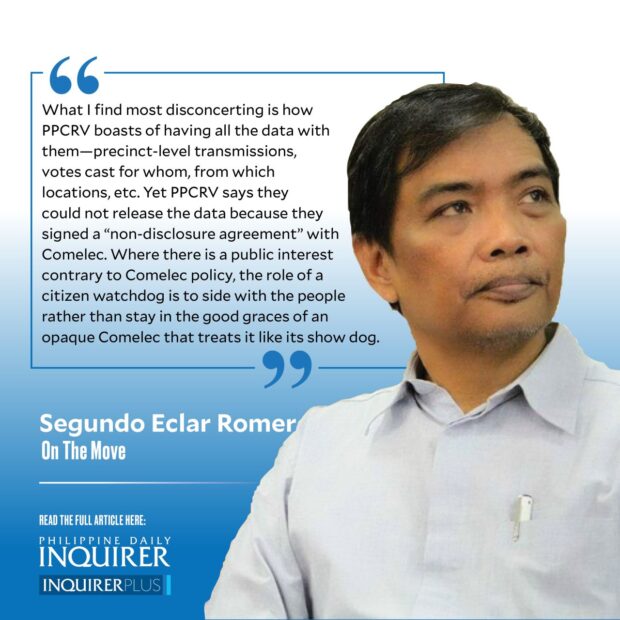Comelec’s burnt offering
 Amidst the controversy surrounding the Commission on Elections (Comelec) stonewalling on the Eliseo Rio Jr., Gus Lagman, and Franklin Ysaac quest for the release of the transmission logs of the May 2022 elections, the country quietly saw its “first-ever” election summit at the plush Sofitel Philippine Plaza Manila in Pasay City on March 10-13.
Amidst the controversy surrounding the Commission on Elections (Comelec) stonewalling on the Eliseo Rio Jr., Gus Lagman, and Franklin Ysaac quest for the release of the transmission logs of the May 2022 elections, the country quietly saw its “first-ever” election summit at the plush Sofitel Philippine Plaza Manila in Pasay City on March 10-13.
Curiously, the summit was not a well-advertised affair, although it was well-attended by an eminent crowd of 400 people who participated “by invitation only.” It looked to me like deft filtering and segregation of the biodegradables from the recyclables.
The recyclables, of course, must be the top political and bureaucratic officialdom of the country—the President, Vice President, senators, representatives, other dignitaries, and the people who managed the last elections. There were supposed to be civic and nongovernmental groups invited, but I may have to petition the Supreme Court for the attendance logs to verify this.
Article continues after this advertisementI had a déjà vu Marcosian moment when I listened to the welcome remarks of Comelec chair George Garcia. Elegant in his judicial robe, he said: “The inevitable consequence of not listening to the people is disenfranchisement, disaffection, distrust, and dissidence. We do not want to be on the wrong side of history. In the final analysis, the strength of our democratic system lies in the opportunity it allows our people to examine and correct our own excesses and shortcomings. We the servants of the people should therefore act accordingly.”
Could he have been talking about how the Comelec has ignored the issues raised by Rio, Lagman, and Ysaac against the Comelec?
We had Garcia as our main speaker during the Vinzons Policy Center-UP Alumni Association forum on “Lessons learned from the May 2022 elections: How we could make future elections more transparent, accurate, and credible” last Wednesday, March 22. Garcia repeated his commitment to transparency and accountability, and even proposed novel transparency features in the voting machines for the May 2025 elections. This was the cue for me to ask him why he has not released the May 2022 election transmission logs, the petition for the preservation and release of which had been elevated to the Supreme Court.
Article continues after this advertisementI was taken aback by Garcia’s answer. He said the request for the transmission logs was directed at lower Comelec offices and was not addressed to him, and that it was only recently that it reached his office. This answer was as petulant as it was lame. Still, I was mollified when he boldly announced with a flourish that right after the forum, he was instructing the Comelec staff to upload the transmission logs onto the Comelec website.
The next day, Comelec made public 707 pages of all the 106,023 transmissions during the May 2022 elections. Each item consisted of just four items—a transmission package sequence number, the clustered precinct ID, the number of votes, and the “reception date time.” The document was as copious as it was stingy, following the old Spanish regime bureaucracy formula– “obedesco pero no cumplo (I obey but I do not comply.)”
Clearly, we have just begun round one. The data provided by the Comelec only whets the appetite of those who have suspicions of massive cheating during the elections. Rio found the data nonresponsive, being “reception” logs rather than “transmission” logs.
With additional data, the observed “constant” 68 percent:32 percent ratio of Marcos to Robredo votes that has been dismissed due to the “theory of large numbers” could now be examined to see if the ratio was also true of the initial transmissions.
The Parish Pastoral Council for Responsible Voting (PPCRV) and Legal Network for Truthful Elections speakers in the forum shared their frustrations. Anna Singson and lawyer Ona Caritos observed that so many of the questions about the May 2022 elections would have been so easy to dispose of were the Comelec only less defensive, well-meaning, transparent, and cooperative. So, the story really is, why is Comelec stonewalling?
What I find most disconcerting is how PPCRV boasts of having all the data with them—precinct-level transmissions, votes cast for whom, from which locations, etc. Yet PPCRV says they could not release the data because they signed a “non-disclosure agreement” with Comelec. Where there is a public interest contrary to Comelec policy, the role of a citizen watchdog is to side with the people rather than stay in the good graces of an opaque Comelec that treats it like its show dog.
















